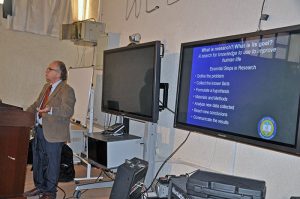
Ethiopia is now at a point where non-communicable disease is overtaking the classic major infectious and malnutrition disorders which dominated the major morbidity and mortality for the country. Now more than ever with scant resources and unique cultural situations there is a need for effective clinically related medical research at the top universities in Ethiopia. Effective clinically related medical research in Ethiopia requires that academic medical centers begin to train physician-scientists.
Unfortunately the model of how to do medical research and by whom it should be directed and/or overseen is outdated. Because medical schools lagged behind the development of fields like Public Health and Nursing these entities dominated the university structure. At the beginning there were no specialists and very physicians who were so overworked they really had no time for training in methods of research let alone doing it.
Today over 50% of the needs of Ethiopian doctors require specialist training. Additionally the experiments such as occurred in British National Health Service of relying on mostly non-physician scientists to direct and oversee medical research backfired. In the current system almost no funds are directed to physician directed medical research yet Ethiopia desperately needs physician-scientists to lead the way into dealing the health care needs of a growing population of over 100 million people.
We are currently advocating changing this system at Mekelle University. Similar changes are already occurring at St. Pauls Millenium and Addis Ababa University in Addis Ababa, Ethiopia.
The Alliance for Academic Internal Medicine has published these recommendations for training physician-scientists which I think should be strongly considered for adoption wholly or least substantially in Ethiopian university training centers.
Summary of Best Practice Recommendations for Physician-Scientist
(The American Journal of Medicine, Vol 131, No 5, May 2018)
Physician-Scientist Training Programs (PSTPs)
Curriculum and Infrastructure
A. Providing combined residency and subspecialty fellowship training is an attractive feature.
B. PSTPs should include training in study design, biostatistics, team science, ethics, scientific regulatory requirements,
institutional review board application, grant writing, time management, leadership, work/life balance, and mentor/mentee
relations.
C. Directors of PSTPs would benefit from organizing a formal alliance and meeting regularly.
Recruitment and Selection of Trainees
A. Candidates for PSTPs most likely to translate their training into successful careers as well-established physician-scientists
are those who have significant research experience and can demonstrate a balanced commitment to both science and
medicine.
B. PSTPs should make increasing diversity among its trainees a stated goal, with active efforts to recruit qualified women and
members of underrepresented minority populations.
C. Initiatives to recruit qualified international medical graduates as trainees should be increased and additional sources of
funding for international medical graduates trainees should be pursued.
Mentorship Practices
A. Mentoring teams are essential for PSTP trainees and should be carefully crafted.
B. Mentors need to be formally trained in mentoring, and they need to be recognized for their contributions.
4. Funding of PSTPs and Their Trainees
A. The success of PSTPs and their trainees is highly dependent on strong institutional support.
B. The success of PSTPs and their trainees is also highly dependent on adequate levels of external funding including the
successful receipt of individual career development awards.
Tracking Success of PSTPs and Their Graduates
A. Success factors of PSTPs and their graduates should be tracked.
B. Tracked data should be coordinated with other PSTPs and shared in a national data base.
6. Sustaining PSTPs and Employing Continuous Improvement Practices
A. Sustainability is contingent on institutional support and an adequate census of qualified applicants.
B. Sustainability is also impacted by the percentage of trainees who successfully complete their training.

